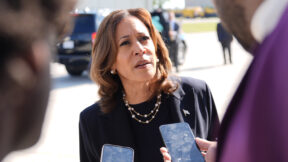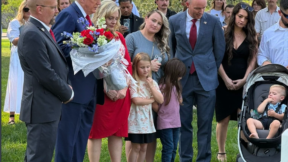‘I Had Black Friends Growing Up’: Nikki Haley Defends Past Comments About Civil War and Slavery
Republican presidential candidate Nikki Haley defended her controversial remarks about the Civil War, which were accused of minimizing the role of slavery, by telling CNN that she “had Black friends growing up.”
During CNN’s town hall with Haley on Thursday, moderator Erin Burnett said:
I want to ask you about something that’s been a challenge for your campaign over the past week, and this of course is referring back to New Hampshire, where you were asked to explain the cause of the Civil War. You obviously did not mention slavery, and afterwards you came up, you said that was a mistake, in fact you said it should have been the first thing that you said. So you did come out and say that. Chris Christie, though, came out and said that you gave that answer not because you’re, in his words, dumb or racist, but because you’re, quote, “unwilling to offend anyone by telling truth.” What do you say to that?
Haley replied, “No one’s ever said that I’m unwilling to offend. I offend plenty of people because I call people out when they do something wrong.”
She continued:
What I will tell you is Chris Christie is from New Jersey. I should have said slavery right off the bat, but if you grow up in South Carolina, literally in second and third grade you learn about slavery. You grow up and you have– you know, I had Black friends growing up. It is a very talked about thing. We have a big history in South Carolina when it comes to, you know, slavery, when it comes to all the things that happened with the Civil War, all that. I was over– I was thinking past slavery and talking about the lesson that we would learn going forward. I shouldn’t have done that. I should have said slavery. But in my mind, that’s a given, that everybody associates the Civil War with slavery.
Burnett pointed out that her children in New York “learn about slavery in first grade too,” before asking Haley, “Can you share what the discussions about slavery were like in your household?”
“I think no different than anyone else in South Carolina,” said Haley. “We were the only Indian family in a small, rural southern town. We weren’t White enough to be White, we weren’t Black enough to be Black. They didn’t know who we were, what we were, or why we were there.”
Haley went on to mention yet again that she had Black friends growing up, telling Burnett:
It was not just slavery that was talked about, it was more about racism that was talked about. It was more about, you know, we had friends, we had Black friends, we had White friends, but it was always a topic of conversation, even among our friends, and in the south, we’re very comfortable talking about it because we know that’s what it is.
According to the New York Times, “the ‘some of my best friends are black’ defense” has “so often been relied on by those facing accusations of racism that it has become shorthand for weak denials of bigotry — a punch line about the absence of thoughtfulness and rigor in our conversations about racism.”
The defense has become so controversial that even Wikipedia has an entire page dedicated to the phrase, “I’m not racist, I have black friends.”
Watch above via CNN.
Have a tip for us? tips@mediaite.com






